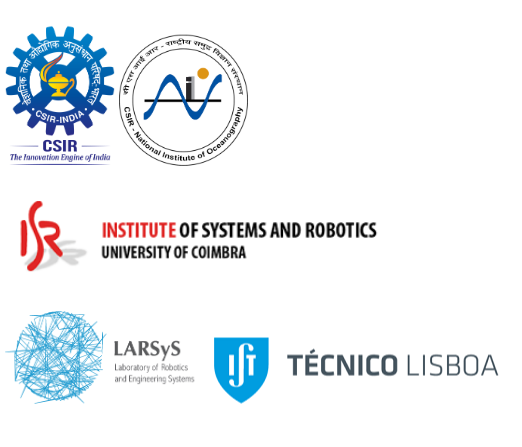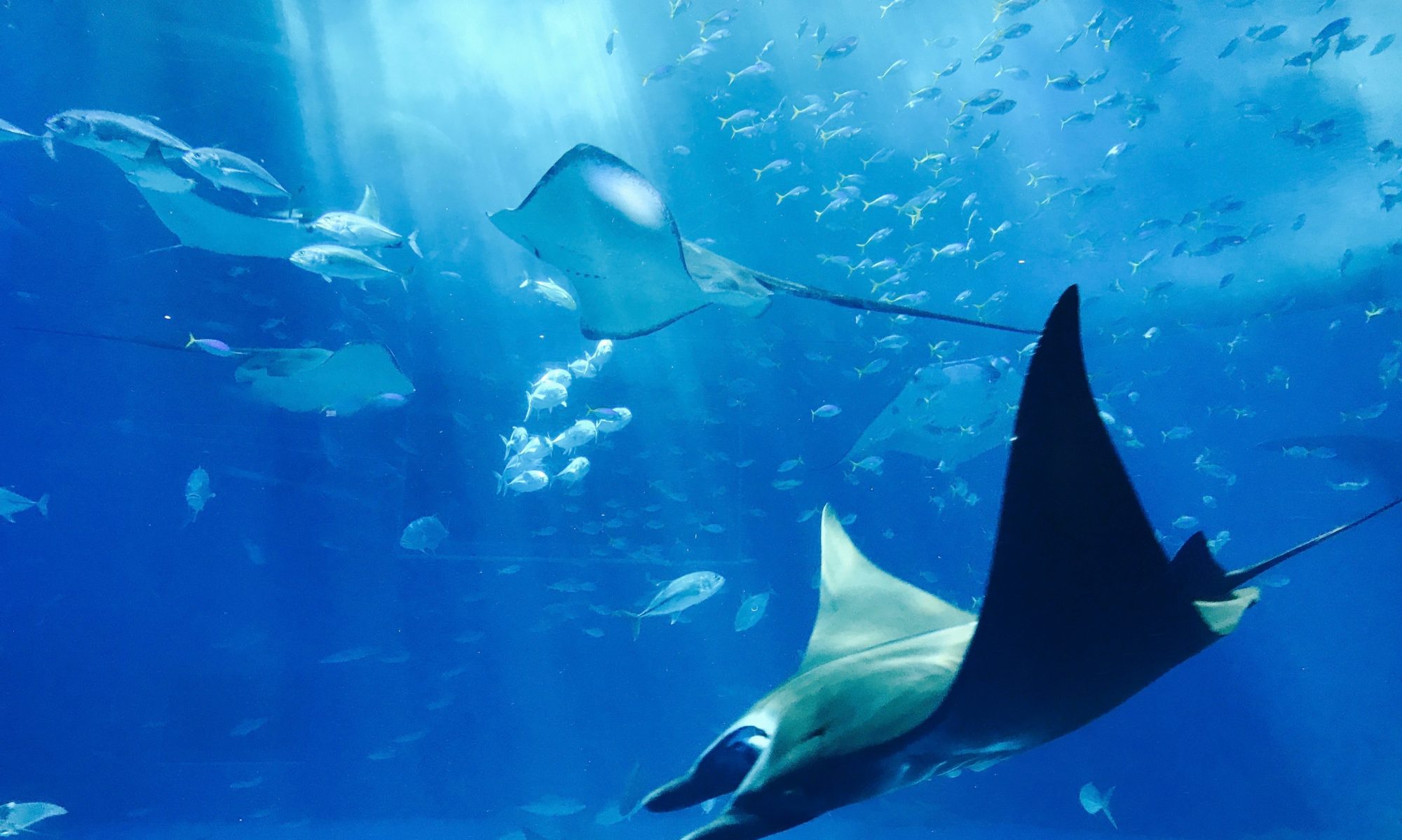Marine Robotics School, Goa, India
Nov. 20-25, 2023
We are pleased to announce the upcoming Marine Robotics School to be conducted at
CSIR National Institute of Oceanography (NIO), Goa, India from Nov. 20-25, 2023 in the
scope of the EU Ecobotics.Sea project and the India-Portugal cooperation program.
This is the 5 th in a series of Marine Robotics Schools at NIO, Goa first organized in
2012. The positive feedback we have received from students, researchers, and
practitioners drawn from a wide spectrum of institutions and commercial companies was
extremely encouraging, to the extent that we continued to offer the school in 2013,
2015, 2018 and now in 2023 by inviting well known researchers and systems
developers in marine technology from Europe, USA, and Asia with the goal of making
these schools unique from a theoretical and practical standpoint. In a nutshell, the
school aims to contribute to building bridges in the marine robotics research community,
foster cross fertilization of ideas between marine science and technology, and give
renewed impetus to outreach activities with a strong societal impact. Underlying the
design of the school program is the desire to afford young researchers and systems
developers a fast paced introduction to the multifaceted topics required to design, build,
and operate single and multiple vehicles for commercial and scientific applications.
In line with what was very successfully done in the previous editions, we will bring
together a number of lecturers from across the world with recognized expertise in
marine robotics and related areas. We hope the Marine Robotics School will foster
vibrant discussions among all participants and become the starting point for the
definition of common R&D projects at an international scale.
This school stands out for its unique combination of factors that make it an exceptional
opportunity for participants. NIO, known for its pioneering work in underwater robotics in
India and solid cooperation links with European institutions, serves as the perfect host
institution. With its extensive expertise and research contributions in this field,
participants can expect unparalleled guidance and mentorship in the course of an event
that will also benefit from the participation and engagement of well reputed researchers
and practitioners from other continents. The school will also benefit from NIO’s strongconnections to academic institutions and industries throughout India. This network
facilitates collaborations, promotes knowledge exchange, and creates opportunities for
future research projects and employment prospects.
We encourage and welcome the participation of engineering students (undergraduate,
graduate, and doctoral), researchers working in marine science and technology,
university lecturers and professors, representatives of governmental institutions,
commercial operators, and other marine stakeholders
To students and researchers
The Marine Robotics School at NIO offers participants a unique opportunity to leverage NIO’s rich international collaborations and work with renowned researchers and
scholars worldwide on state-of-the-art technologies in the field of marine robotics.
Furthermore, this school offers an exceptional opportunity for multidisciplinary
collaboration. Participants will have access to a community of researchers from various
fields, fostering an interplay between marine science and technology. This dynamic
interplay serves as a catalyst for the development of innovative technologies to cater to
the evolving needs of ocean science. Lastly, the school focuses on skill development
and entrepreneurship, equipping participants with specialized knowledge and practical
skills related to marine robotics. This empowers them to explore innovative ideas,
develop prototypes, and potentially establish their own entrepreneurial ventures within
the marine robotics sector.
To Industry Participants
Additionally, the Marine Robotics School emphasizes technology transfer and industry
collaboration, creating a platform for showcasing cutting-edge robotic technologies
developed at NIO. Industry representatives will have the opportunity to engage with
participants, providing insights into market needs and fostering potential collaborations
for research and development initiatives.
To the speakers
The Marine Robotics School at NIO offers a platform to the speakers to create
connections to young and dynamic students. This connection facilitates knowledge
exchange, cultural exchange, networking opportunities, collaboration potential, and
exposure to emerging talent. These features of the school create a rich and stimulating
environment for both speakers and students, fostering mutual growth and advancement
in the field of marine robotics.
School Organization
The Marine Robotics School will be hybrid in order to allow for the participation of a
large audience from different parts of the world. However, we strongly encourage
participants to attend in person in order to benefit from direct exposure to researchers
and students, exchange viewpoints during and outside the classes in a leisurely manner, and participate in the demonstration of marine robotic systems. The complete
program and the list of lecturers will be published later.
As a follow up, steps have been initiated to publish a book with the tentative title “An
Introduction to Marine Robotics: from Mission Scenarios to Systems Design and
Operations at Sea”. Borrowing from the presentations at the School, the core idea is to
organize a book with a number of Chapters dedicated to different subsystems (e.g.
modeling and identification, NGC, data-driven control. vision and acoustics- based
navigation near complex infrastructures, AI based approaches for sensor fusion and
decision making, motion planning, hardware/software for real-time systems, system
implementation, etc). Underlying the “technical scent of things” there will be a series of
challenging and timely missions scenarios analyzed by marine scientists, commercial
operators, and other actors involved in Ocean Literacy. The distinguishing feature is to
view each Chapter as a simple entry point for a number of specific topics, with concepts
and techniques illustrated mostly through the use of diagrams, figures, pictures, etc.,
pointing to references for further mode detailed technical information. We do not believe
such a book is available and we look forward to working with all lectures to make it
become reality.
Core topics
- Marine science, technology and innovation
- Robotic Vehicles: Modelling and Simulation
- Introduction to Linear and Nonlinear Control Theory, Estimation Theory and Observer design
- Navigation, Guidance and Control of Autonomous Marine Vehicles
- Obstacle Detection and Avoidance, boundary mapping/source localisation
- Cooperative Motion Control and Planning
- Vision nd Sonar-based Simultaneous Localisation and Mapping (SLAM)
- Non-conventional navigation systems using geophysical features
- Acoustic Networks
- Bio-inspired Marine Vehicles
- Intervention Vehicles: Robots and Manipulators
- Systems implementation using Robot Operating System (ROS) and Hardware-in-the-loop Simulations (HIL)
- Remotely Operated Vehicles (ROV) and Deep Ocean Vertical Profilers
- Marine robotics in the Blue Economy
- Machine learning and artificial intelligence in a marine robotics context
- Robotic and computer vision in harsh environments
- Aerial and marine drone cooperation
Conference organizers
CSIR-National Institute of Oceanography (NIO), Goa, India – Pramod Maurya
Institute of Systems and Robotics (ISR)/Univ. Coimbra, Portugal – Jorge Dias and Jorge
Lobo
Laboratory for Robotics and Engineering Systems – ISR/IST Univ. Lisbon, Portugal –
David Cabecinhas and António Pascoal

